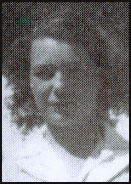Rosaleen Ross

Rosaleen Ross was born in Bedfordshire on 12th May 1909. Her father, an engineer, was chairman of the local Independent Labour Party.
After leaving school she became an assistant teacher at a small private school. In 1926 she moved to London where she met and became friends with Ralph Bates and Winifred Bates. She went to Labour Party meetings but later recalled: "I found the meetings extremely boring - there were all these - what looked like old men, you know, probably thirty or something, with these stiff collars, sitting around, you know, moustaches... I don't recall any women in the meetings. I did not stay long."
Rosaleen Ross eventually joined the Communist Party of Great Britain and took part in the demonstrations against Oswald Mosley and the British Union of Fascists.
Rosaleen was in the Pyrenees with Winifred Bates when the Spanish Civil War began. They went to work for the Popular Front government in Barcelona. She later found work with the British Medical Unit as an administrator. Her first post was at Grañén near Huesca on the Aragon front. Other doctors, nurses and ambulance drivers at the hospital included Kenneth Sinclair Loutit, Alex Tudor-Hart, Reginald Saxton, Archie Cochrane, Penny Phelps, Peter Spencer, Annie Murray, Julian Bell, Richard Rees, Nan Green, Lillian Urmston, Thora Silverthorne and Agnes Hodgson.
Rosaleen found conditions in Spain very difficult: "Existence is a misery. Rain is coming in. Rats run across the floor. Our rations are tinned meat, chick peas and five almonds each. We are afraid to undress night or day because of the bombing. We have no milk, eggs or potatoes for the typhoid patients (yet owing to good nursing only 8 per cent died). I cannot say enough about the splendid way Ada Hodson, Patience Darton and Lillian Urmston are working. How Ada makes us laugh when she tries to drink the peculiar liquid which is neither tea, coffee nor cocoa, but a mixture of all. Lillian's morale is never destroyed."
While in Spain, Rosaleen fell in love with Reginald Saxton. He later admitted: "As time went by I felt that she and I merged into one person. But marriage was a much smaller thing than the war and it was something we never talked about."
After the Republican forces were defeated in the Spanish Civil War, Rosaleen went to live in Brighton with Reginald Saxton. They planned to marry but because of objections from his family she decided to move to Canada where she married a former member of the International Brigades. Their son was born in 1940.
After the Second World War she was active in the Communist Party of Canada, Friends of Free Spain and several peace groups.
In 1996 Rosaleen met Reginald Saxton at an International Brigades reunion. After the death of his wife in 1998 he went to live with her in Canada. They returned to live in England in 2002. Saxton died in Worthing on 27th March 2004.
Primary Sources
(1) Rosaleen Smythe, quoted in Women's Voices in the Spanish Civil War (1991)
Existence is a misery. Rain is coming in. Rats run across the floor. Our rations are tinned meat, chick peas and five almonds each. We are afraid to undress night or day because of the bombing.
We have no milk, eggs or potatoes for the typhoid patients (yet owing to good nursing only 8 per cent died). I cannot say enough about the splendid way Ada Hodson, Patience Darton and Lillian Urmston are working. How Ada makes us laugh when she tries to drink the peculiar liquid which is neither tea, coffee nor cocoa, but a mixture of all. Lillian's morale is never destroyed; I admire her.... By now Dr Saxton has started a canteen in which we sell mouldy bread and jam, cognac and Malaga wine.
(2) Paul Preston, The Guardian (8th April 2004)
While in Spain, Reggie (Saxton) fell in love with a working-class medical administrator, Rosaleen Smythe. In a 2003 interview with the Guardian, he commented: "As time went by I felt that she and I merged into one person. But marriage was a much smaller thing than the war and it was something we never talked about."
He assumed that on returning to England they would marry, but he seems to have hesitated in the face of his family's snobbish disapproval of Rosaleen. Uncertain of any future with him, she settled in Vancouver with another brigader whom she married.
After a period of deep depression provoked by both the defeat of the Republic and the loss of Rosaleen, Reggie became assistant medical office of health (civil defence) for Brighton (1939-41). Thereafter, he rose to the rank of major in the Royal Army Medical Corps blood transfusion service in Burma and was mentioned in dispatches for bravery.
Postwar, Saxton practised as a GP in Patcham near Brighton and married Betty Cogger, a former actor who had two children from a previous marriage. Together, they had two children, Rosaleen and Christopher. He was, by all accounts, a wonderful father to all the children. With Betty, he went to work as a south Wales GP in partnership with Dr Alexander Tudor-Hart.
He remained politically active as an anti-war campaigner both in the Campaign for Nuclear Disarmament and "Medics Against The Bomb". On retirement, he returned to Brighton.
Rosaleen eventually divorced, and she had enduring feelings for Reggie. They were reunited at the 1996 Madrid reunion of the International Brigades and, when he was widowed in 1998, they went to live together in Canada. In 2001, he took part in a moving reunion at the cave hospital. In 2002 they returned to England. Although frail and in his 90s, with diminished sight and hearing, but as mentally alert as ever, he campaigned against the war in Iraq.

